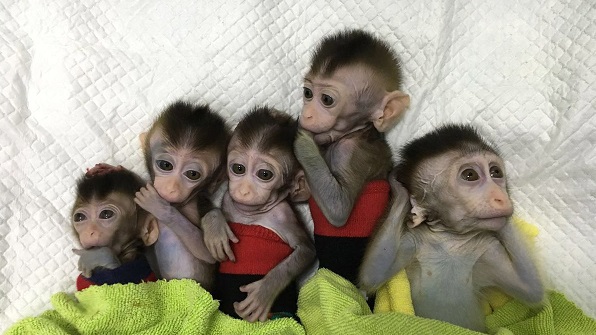China clones Gene-edited monkeys
January 26, 2019 | Expert Insights

Chinese scientists cloned five monkeys from a gene-edited macaque with circadian-related disorders, another first for the country in the controversial field.
China’s dangerous trend of crossing ethical and moral boundaries with genetic alteration has drawn criticisms from all corners of the globe.
Background
The Chinese Academy of Sciences, with historical origins in the Academia Sinica during the Republican era and formerly also known by that name, is the national academy for the natural sciences of the People's Republic of China (PRC). Collectively known as the "Two Academies " along with the Chinese Academy of Engineering, it is an institution of China, functioning as the national scientific think tank and academic governing body, providing advisory and appraisal services on issues stemming from the national economy, social development, and science and technology progress.
It is the world's largest research organisation, comprising around 60,000 researchers working in 114 institutes, and has been consistently ranked among the top research organisations around the world.
The Institute of Neuroscience of the CAS is located at Shanghai and has been part of multiple key scientific breakthroughs for the Chinese government over the past few decades.
Analysis
The cloned monkeys were born in Shanghai at the Institute of Neuroscience of Chinese Academy of Sciences, according to two articles published in National Science Review on Thursday. Researchers knocked out BMAL1 -- a critical transcription factor for activating circadian rhythms -- through gene editing at the embryo stage, then cloned a monkey with the mutation.
The announcement follows the recent confirmation that the world's first gene-edited human babies have been born in China, following an "unauthorised experiment" that has caused widespread disquiet in the scientific community. Chinese scientists have cloned five monkeys from a gene-edited macaque with circadian rhythm disorders that are linked to sleep problems, depression and Alzheimer's disease.
This was the first time multiple monkeys have been cloned from a gene-edited adult male, Xinhua News Agency reported, employing the same method used to create the first cloned monkeys born in China in 2017. The result proves batch cloning of gene-edited male monkeys with diseases is feasible, one of the scientists told Xinhua.
A circadian disturbance is related to many human diseases including sleep disorder, depression and Alzheimer’s disease. The creation of monkeys with a uniform genetic background is useful for developing models of human diseases, which can be used to study therapeutic treatments, the researchers said.
The new studies come after Chinese scientist He Jiankui was fired by his university for altering the genes of twin baby girls as embryos. He triggered an international backlash when he shocked the world with his claims of genetically-altering human embryos that resulted in births.
Disorders of circadian rhythm are associated with many human diseases, including sleep disorders, depression, diabetic mellitus, cancer and neurodegenerative diseases, such as Alzheimer's disease. Previously, mice and flies were widely used for the research of such diseases, but these animal models differ greatly from human beings in terms of activity routines, brain structure and metabolic rate.
The cloned monkeys, closer to the human in physiology, make better models for research on disease pathogenesis and potential therapeutic treatments. In order to create an ideal donor monkey, researchers knocked out BMAL1, a core circadian regulatory transcription factor, using gene editing at the embryo stage.
They selected one of the gene-edited monkeys with the most severe disease phenotypes as the donor. The fibroblasts of the donor were then used to clone five monkeys by somatic cell nuclear transfer, the same method used to generate Zhong Zhong and Hua Hua, the first cloned monkeys born in China at the end of 2017.
Assessment
Our assessment is that the cloning of gene-edited monkeys is indeed a commendable feat; however, we believe that there should be strict medical codes of conduct in place before countries pursue ethically or morally ambiguous medical procedures. We also feel that there should be international guidelines for the ethical treatment of cloned animals.








Comments